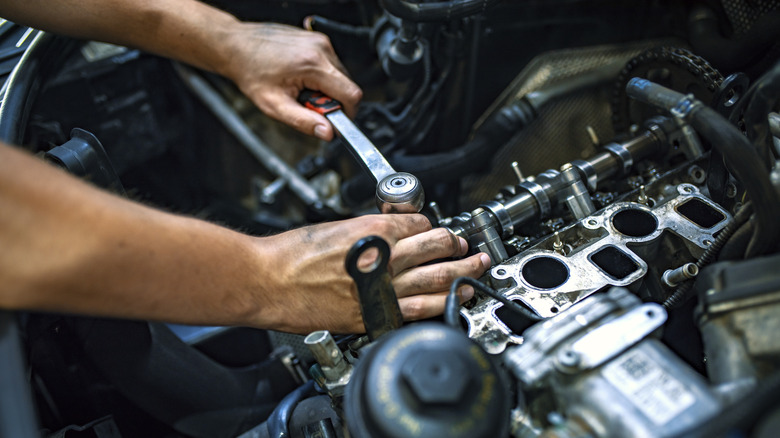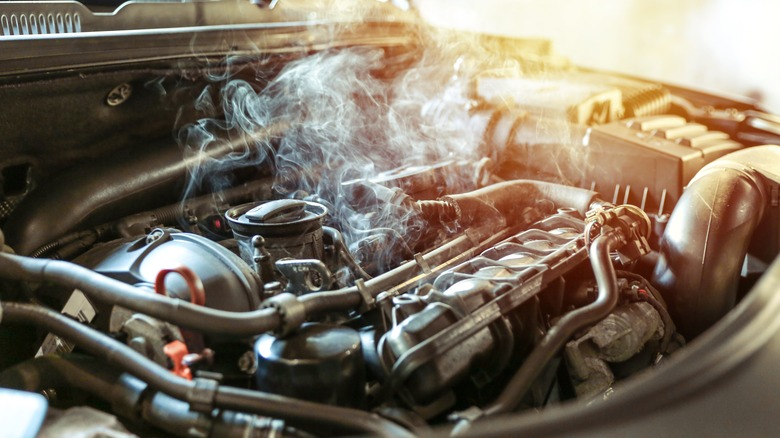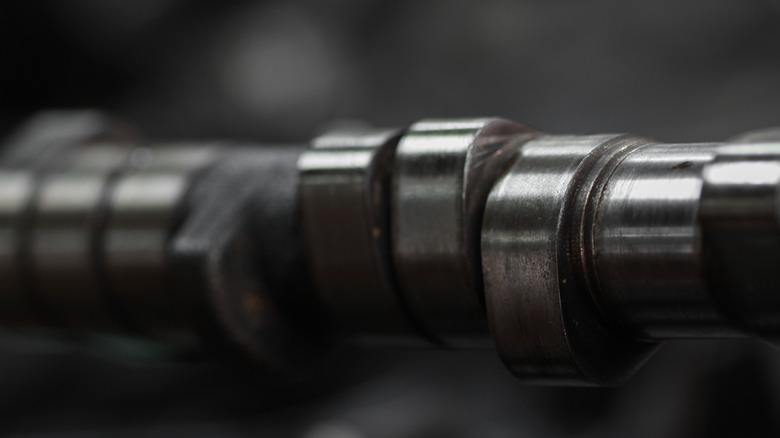What Causes The Famous HEMI Tick, And Is It Bad?
If you own or have been looking into getting a car that uses one of Chrysler's HEMI engines (which doesn't necessarily make it a Chrysler vehicle), chances are you've heard of "the HEMI tick." But what is it, exactly? That part is tricky to pinpoint because there's a big difference between a HEMI making regular engine noises and a HEMI making the kind of noise that can lead to a class action lawsuit, as detailed by CarComplaints.com.
The lawsuit alleges that Chrysler's valve train systems in its HEMI engines, specifically the V8 engines in this particular case, are prone to malfunctioning. This can result in a "ticking" engine, camshaft failure, lifter roller failure, and eventually total engine failure. Allegedly, these vehicles "buck, surge, misfire, idle roughly and make abnormal noises including ticking, knocking, and chirping." The lawsuit also alleges that Chrysler has not addressed the issue, meaning any HEMI engine could carry potential risks.
Knowing the difference between common ticks and creaks that mean nothing, sounds that indicate a simple fix, or the heralds of potential safety issues is key. That is why it's important to look to professional technicians like Reignited – Cycle and Automotive's Sky Perry to determine which sound is yours.
Don't panic yet
If your car has an internal combustion engine, you'll hear some ticks, rattles, and clicks. This doesn't automatically mean something is broken — sometimes these sounds are completely normal. The same applies to HEMI engines. What you need to do is pay attention to the kind of sound, as well as how long it persists, before worrying about a trip to the garage.
A rattling noise on startup, for instance, isn't always cause for alarm. In fact, it's quite common if the engine hasn't been turned on for a couple of days or more. In this instance what happens is the oil used to lubricate the hydraulic lifters has seeped out, causing the metal components to rattle against each other before the oil makes its way back into the mechanism. In this situation, the sound should stop after the engine runs for a few seconds.
Something more akin to a series of quick "tings" or "pings" that persist while the engine is running is also normal and nothing to be concerned about. This is the result of the injector's plungers in a HEMI just being rather loud by default. Chances are you won't hear it while driving, but it might come through if you're leaning over the engine compartment.
When normal ticks are less normal
Unfortunately not all of the noises coming from a HEMI are necessarily typical. That still doesn't automatically mean they're dangerous or will require major engine work.
Remember that rattling noise on startup caused by lifters losing a bit of their lubrication? Well if the noise persists for longer than a few seconds — like it goes on for a couple of minutes or more — then one or more of your engine's hydraulic lifters may have failed. Basically what can happen is that the lifter's plunger stops maintaining oil pressure, resulting in the mechanism pushing metal against metal.
Perry points out that this is generally not something worth panicking over, but you need to get it fixed. Regrettably, this could cost you a couple of thousand dollars at a garage as the process is rather labor-intensive. It's not something you can do much to prevent, either, unless you're capable of performing routine maintenance on your car at home. On the plus side, it's not a super common issue so you may never encounter this particular problem.
Another case of mistaken identity
One other tick that's very common with HEMI engines but still isn't "the" tick — also isn't as scary for your engine or wallet — is one caused by exhaust leaks. This can be sussed out by listening for a tick during startup, only it's probably going to be much louder than an improperly lubricated lifter.
Essentially what happens is the exhaust manifold (or manifolds) and the cylinder heads expand and contract at different rates whenever the engine heats up, which causes warping after enough use. That warping causes some of the studs connecting the two components to break, which leaves a gap between them and can cause a rattle as the engine starts up. Then once things get hot enough, the metal expands and the rattling stops.
It's something you can check yourself before taking your car to a garage. Just make sure the engine is cold (otherwise you risk burning yourself) and pop the hood, then grab towards the back of either or both of the heat shields along the sides of the engine and give them a light tug. If they feel secure, your exhaust manifolds are probably not the problem, and if they do move you likely have some broken studs. The good news is that it's not quite as expensive to fix, with Perry estimating around $500 to $650 per side depending on if the engine is in a truck or car, respectively.
The real HEMI tick
What you really want to listen for is a somewhat irregular — as in not rhythmic — ticking that starts when the engine is idling after it's been running for a couple of minutes. This particular tick may come across as a bit softer than the others, but that only means you're catching it somewhat early. Regardless of how intense the sound is, you need to get it looked at right away.
The cause has to do with a failure of both the lifters and the camshaft. As the lifters fail, the ends begin to move around in ways they aren't meant to, which can chip away at the camshaft and will lead to cylinder misfires over time. Perry suggests keeping up with timely oil changes (about every 5,000 miles or so) and avoiding extensive idling (keeping it under an hour per day) to reduce the chances of this happening
Getting this problem fixed is not cheap — around $4,500 or so — as there's a lot of labor involved on top of needing to fully replace both the camshaft and the lifters. Particularly with 6.4-liter truck HEMIs, as Perry explains, the wearing down of the camshaft can cause the metal to fall into the other components. At this point, Chrysler will require a full engine replacement if you want to keep your warranty.




